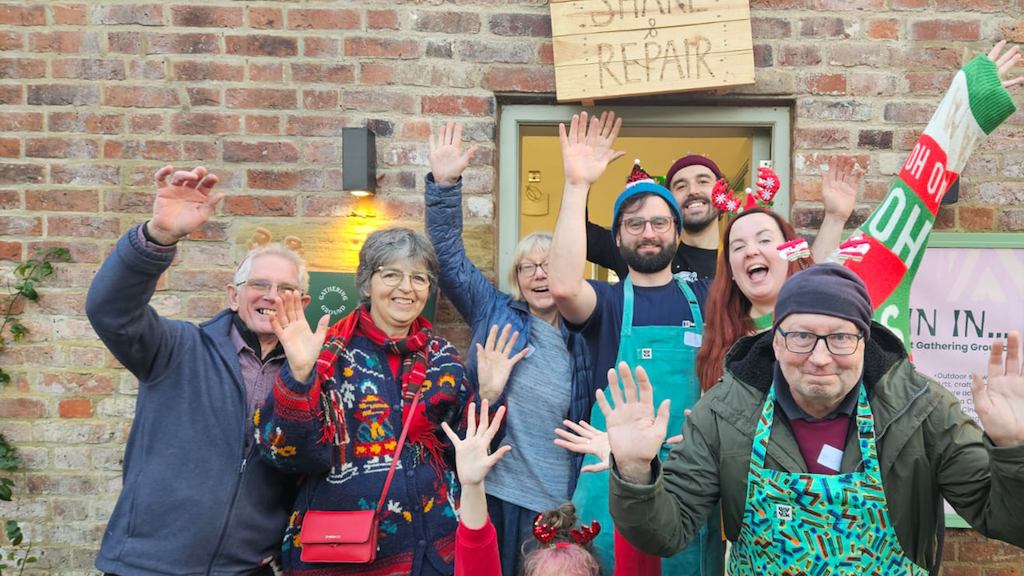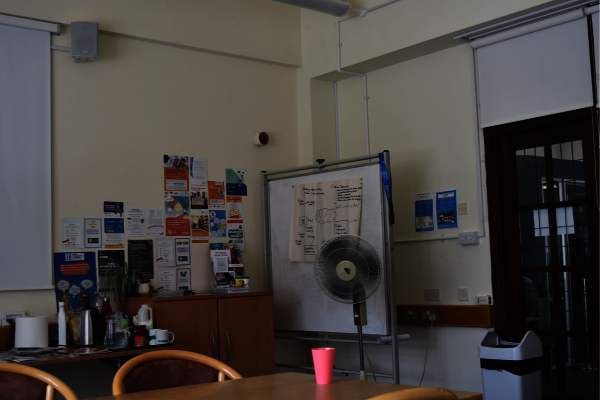The 'neighbourhood arts centre without walls'

Linda Bloomfield, Director of RivelinCo, explains why being an age-friendly employer is so important to her.
RivelinCo is a ‘neighbourhood arts centre without walls’ based in Hillsborough, Sheffield, organising cultural activities for and with the community. Events take place in parks, community centres, high streets, car parks, empty shops, etc. – anywhere non-traditional!
Top tips:
- Don’t rely on digital advertising alone for recruitment if you want to hire people from all age groups
- Offer informal chats about a role to help candidates understand the commitment and decide if it’s right for them
- Sign up to the Pledge as a good way to help you focus on the needs of older workers
Recruitment
“As well as office staff, we employ Arts Support Workers on a flexible basis, who are responsible for enabling the individual events we organise, such as a community repair workshop or weekly singing group, to go smoothly.
“To help ensure we recruit from all age groups, we don’t just rely on digital alone. We also advertise vacancies on community noticeboards at supermarkets, the library and in the local park, and share call-outs with other charities and organisations we collaborate with. We have found that some staff members weren’t necessarily actively looking for a new job, but decided to apply anyway when they saw the vacancy and it was clear it could be for them.
“We make ourselves available for informal chats about the role, which we are regularly taken up on when we advertise. In the last recruitment drive for Arts Support Workers, almost 50% of people who got through to interview stage had arranged an informal chat in advance. It gives candidates the chance to check on the flexibility of the job, and that’s particularly relevant for semi-retired people who may be wary of over-committing themselves.
Flexible
“We offer Flexible Working but that can look very different in every job, so we try to be explicit about our offer and provide opportunities to ask questions at any point during the recruitment process. For us, Flexible Working includes a flexible start and end time to the working day, and shift selection for the rota (rather than assuming availability) – we hope this means people are more easily able to balance work, life and rest, which is increasingly important as we age.
Training
“We offer training based on role, regardless of age. This includes, for example, training in first aid and dementia awareness, and Portable Appliance Testing (PAT) for volunteers who work in our repair shops dealing with electrical items. We hope to add wider opportunities as funding permits. We always pay for people’s time spent on training, and try to be flexible about dates and times, to work around other commitments. We also try to make sure that training opportunities are genuinely beneficial to the individual, so try to put the training into practice within a few months of undertaking it. We try to make career development at RivelinCo equally available to everyone – but we are a very small organisation and so opportunities do depend on our funding situation.
Benefits
“When we started the company – only three years ago – we took legal advice and put in place staff policies that met statutory requirements. But since then, we’ve been doing our best to make the policies more equitable, and signing the Age-friendly Employers Pledge has helped us to concentrate on what was important and what to prioritise.
“We’ve increased our baseline holiday allowance, and now offer Time Off In Lieu (TOIL) and options to Work from Home when needed. Since signing the pledge we have brought in more flexibility around medical appointments, and we’re also now developing a menopause policy.
“We also now offer all core staff a health benefits package, including cashback for eye-tests, dentists’ appointments, therapies, and 24/7 access to a counselling and mental health support hotline.
“Most of these policies support everyone in the organisation, no matter their age or circumstances, but some may need to lean on them more often than others, and we hope they provide a little extra support to those who need it (including older workers).
Access
“Access is a big focus for us, as we work with people of all ages and walks of life in public and community spaces. When it comes to staff, we make sure for any task that might be physically demanding, such as heavy lifting, that we’re aware of access needs or limitations, and people work in pairs. This is not just applicable to older people, but it allows us to ensure that we can rota together someone who is more physically able with someone else who might find a task more challenging.
The Pledge
“I was excited to see the Age-friendly Employers Pledge when it was launched. It felt like something we were already trying to do, but to be able to commit to something and set some aims helped to steer us on the right path. When you are establishing a new organisation, there are so many things to get done at once that individual elements can get lost. Signing up to the Pledge helped us keep focus.
“Intergenerational working is such a core part of our output that it feels important to me that it’s something we keep considering for the workforce too. It keeps it at the forefront of our minds.”



